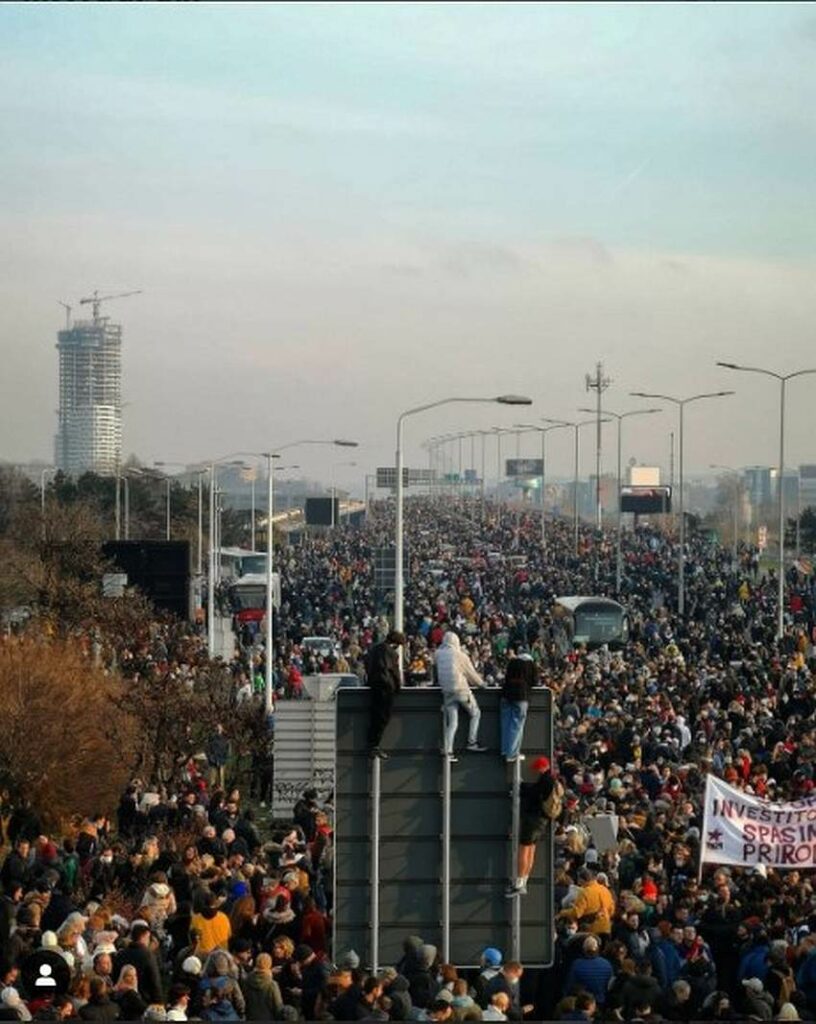Residents of Serbia against local corruption and global neo-colonialism
The end of 2021 in Serbia was marked by mass civil protests in 50 Serbian cities that united many civic environmental movements, organizations dedicated to human rights and individual citizens gathered around the intention to prevent cardinally harmful economic projects of the Serbian government, including opening lithium mine in the Jadar area in western Serbia.
Rio Tinto – sounds nice but what does it really mean?
The mine is scheduled to be opened in 2023 by the controversial Anglo-Australian corporation Rio Tinto, which is currently conducting tests and pre-preparations in Jadar. Apart from its megaprofit, the corporation is also known for often triggering numerous environmental problems at excavation sites. Immediately after Rio Tinto closed the copper and gold mine in Papua New Guinea in 1989, there were major floods, pollution of wells and rivers, and disease in the area. In 2020, Rio Tinto mined the Aboriginal archaeological site of Juukan Gorge during excavations for the purpose of expanding mines in Western Australia. Given that lithium is treated as “gold” in order to achieve the global Green Deal, the project in Serbia is estimated to provide material for the production of more than 1 million electric vehicles in Europe and North America. Angela Merkel stated during her last official visit to Serbia that Germany is also interested in Serbian lithium.
Rio Tinto, in cooperation with the Government of Serbia, is pressurising the citizens of the settlement in Jadar to sell their houses and properties where their ancestors lived for centuries, so that the vast area of very fertile land could be turned into a mine. Environmental experts, as well as mining experts, opine that the same scenario will occur in Serbia as in Papua New Guinea, because the current technology of this company is still based on the use of large amounts of water and the elimination of opportunities for agriculture. Due to the estimated 1,000 jobs in the future mine, 19,000 farmers could lose their livelihoods. The Serbian Government has amended several laws through non-transparent procedures to enable Rio Tinto to “work more efficiently”!
“No pasáran”
However, the persistent work of several environmental organizations on the disclosure of behind-the-scenes data related to this and other environmentally harmful projects and pointing to the catastrophe that threatens every farmer from western Serbia, as well as the wider Serbian population, has caused occasional but regular civil protests throughout 2021. By joining dozens of environmental and other civic initiatives on December 4, according to some estimates, as many as 100,000 people blocked major roads across Serbia. The blockade lasted for an hour, the government immediately condemned the protests, calling them “fascist”. But after the protest, President Vučić withdrew two controversial laws whose abolition was demanded by the protests. This “concession” to the citizens represents a precedent in the rule of Aleksandar Vučić, so many believe that this act is also an announcement of his end.
One of the protesters is the famous Serbian musician, writer and activist – Marko Šelić Marchelo, who also performed in Ulm. His entire work is characterized by a rebellion against autocracy, due to which he often endured unpleasant consequences. For Radio Free FM he comments on the protests and their perspective.
- What do environmental protests in Serbia mean for you personally?
the great importance for us and about which the public in Serbia – none of us – did not know enough
until now, although all this is very harmful for us. And now it has happened that anger has broken
out on the streets because the government is hiding many facts from the citizens of my country. I
regret that people didn’t go on the street a little earlier so massively, and on the other hand, of
course, I am infinitely glad because now they are reacting. At least now. I want to believe that it is
never too late!
- Is there new energy that can lead to major political changes?
politically to be truly exploited and brought to the forefront. Whether anyone can articulate that and
make a valid political result out of it remains to be seen. It turns out that it is not at all grateful to
make predictions. In our country, the situation is very uncertain, and pessimists would say it is even
certain – that this energy will quickly weaken and disappear. Of course, this is not impossible. But it is
up to me to be with my fellow citizens on the street and to believe that all this is not in vain. And the
more we believe, the greater the chance that one day it won’t be in vain. Whether that day will
come in 2022 also remains to be seen!
“All Quiet on the Western Front?” Or maybe not?
Gordana Nikolic from Belgrade, who missed almost no protest during the 30 years of the civil struggle for democracy in Serbia, says to Radio Free FM: “The goals of the struggle have remained the same for 30 years: truth, justice and freedom! I have not lost strength or hope!!! In the end, however, the situation in the country largely depends on us! ” Serbia will face elections in April 2022. After the fulfilment of specific demands by the authorities, the protests were reduced, but they are still being held, while Rio Tinto, as a sublimation of corrupt aspirations of the Serbian government, united with global profiteers of neo-colonial manners, is still in Serbia. Many citizens eager for substantial changes and reforms in Serbia are currently hoping that environmental activists and protagonists of these protests will become a new political opposition, which could possibly mobilize the missing new Serbian electorate, encouraged by this current victory and gathered around basic principles that mean life: earth, water, air … and dignity.





